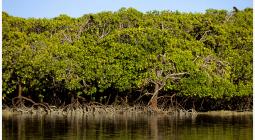Reefs made from human ashes could revive British seabeds, says startup
UK company offers alternative to land-based burials after success of memorials in Bali made from remains of pets
Death is killing our planet. That is the stark assessment of a new business offering an innovative alternative: having your loved one’s ashes made into a reef and anchored to the British seabed.
There are increasing concerns about the environmental cost of traditional funerals: a single burial generates 833kg of CO2, while a typical cremation has a footprint of about 400kg of CO2. In the US alone, 1.6m tonnes of concrete and 14,000 tonnes of steel is used each year for building graves. Chemicals from embalming processes seep into the soil.
But now a British startup, Resting Reef, is redefining what a cemetery can be by turning the ashes of humans into memorial reef structures. “Cemeteries should be places that reconnect us with nature and remind us that we’re part of a larger ecosystem,” said Aura Murillo Pérez, the company’s co-founder, who met her business partner, Louise Skajem, when they were doing their master’s degrees at the Royal College of Art and Imperial College London.
Resting Reef uses aquamation, an alkaline process for cremation, to combine pet or human ashes with crushed oyster shells and concrete into a material proven to enhance marine growth.
“Oyster reefs can help regenerate marine growth but 85% have been lost due to human activities. We are using animal and human ashes to mimic those natural reefs,” said Murillo Perez.
The formula is then moulded into reef structures designed to create diverse habitats for a variety of fish species through differing heights, textures and tunnel systems. When the reef is ready, it is anchored to the seabed at a depth of about 10 metres where it will regenerate marine biodiversity, filter water and prevent coastal erosion.
Resting Reef began incorporating the ashes of pets into artificial reefs in Bali, Indonesia, last year. But demand has been so great that the company is opening up the offer to human ashes. The company is working to secure licences to replace degraded seabeds with artificial reefs at the Plymouth Breakwater on the south coast of England, a 1,560m stone breakwater protecting the Plymouth Sound.
“It’s time for the death industry to change: we want to shift the industry from focusing on death to life and regenerate growth,” Murillo Pérez said.
The business was a finalist in the Terra Carta Design Lab, a global competition established by King Charles and the British designer Jony Ive, and an Innovate UK grant. The co-founders were named in the Forbes 30 Under 30 list for social impact in Europe.
“We conducted a pilot reef in Bali in 2024, collaborating with the local Balinese community,” Murillo Pérez said. “We have placed 24 memorial reefs for pet owners in the US, UK and other countries.
“The pilot project attracted 84 fish species and achieved fish diversity 14 times greater than nearby degraded areas. This is very exciting.”
Skajem, whose master’s was on the decline of oyster reefs and coral reefs due to the climate crisis and human activities, said: “We do not see ourselves working with death but rather providing better lives for coming generations by changing a very polluting industry and practice.”
Resting Reefs hopes to have the UK licences in 2026 and to establish the first reef six to 12 months later. Human memorials have an initial cost of £3,900, although families can pay more for a range of curated activities at the site.
Prof Rick Stafford, who specialises in artificial reefs and marine biodiversity at Bournemouth University, praised the company for increasing local biodiversity.
“Resting Reefs is different from other companies because it focuses on enhancing biodiversity close to the shore,” he said. “It’s entirely in line with environmental policies like protecting 30% of the world’s land and sea by 2030, and the marine net gain policy to ensure developments in the marine environment leave the ecosystem in a better state than before, with a focus on improving biodiversity.”
Peter Holt, director and co-founder of the Plymouth-based Ships Project, a marine consultancy service, also praised the business. “I’m very excited by the project and its potential to improve marine habitats and support a range of maritime industries,” he said.
“The project has received support from the whole community here, including the king’s harbour master, because it will potentially boost diving tourism and fishing, while aligning with the Plymouth Sound national marine park’s goals to re-engage the public with marine life.”
Cover photo: Resting Reef says its pilot project, in which it placed 24 memorial reefs on Bali’s seabed, attracted 59 fish species. Photograph: Resting Reef




